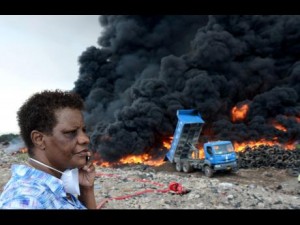History often repeats itself, sometimes much to the discomfort of humanity and there is, at times, little or nothing that can be done to prevent repeats especially when it comes natural disasters. Jamaica is no stranger to repeated natural disasters which come annually in the form of hurricanes and floods. Those disasters are always anticipated and as such are often addressed accordingly.
On the flip side of the coin Jamaica has also seen many a disaster in the form of fire; from the razing of simple dwelling places to wild bush fires and sadly in almost all cases, the reaction on the part of those in whom are vested the power to curtail and or stem such life destroying occurrences.
One too many lives have been lost and too many infrastructures needlessly destroyed as a result of the failure on the part of the government of the country in establishing a workable solution to the handling of fires.
One fiery situation among the many takes center stage every time it manifests is the “Riverton Fire”.
Riverton is a 119 hectares piece of land situated adjacent to the mangroves and the Duhaney River in St. Andrew. It is home to a housing scheme and a miniscule population who for the most part thrive on the resources that are retrieved from one of the island’s major dump sites.
We all need to dispose of waste on a daily basis. In Jamaica, there has been a 50% increase in per capita generation of solid waste in the last 5 years alone. 1.2 million tons of waste is generated annually across Jamaica. Riverton receives 60% of the waste produced. Sadly, the Riverton dump is poorly managed and as such public health is at risk as in the case of any other poorly managed dump sites.
Riverton, however, can safely be deemed as a special case, in that unlike other dump sites the Riverton dump is located in too close of a proximity to dwelling community and a main thoroughfare. As if that weren’t enough there is a case of the Duhaney River, a source of drinking and bathing water for people living nearby, being polluted. Hunts Bay, located nearby is deemed by scientists to be a ‘dead zone’ as a result of heavy metal contamination from cadmium, manganese, lead and pesticides.
The situations surrounding the dump become more compound by a recurrence of fire in the landfill which when occurs lasts sometimes up to two weeks, deposits a wealth of health altering smoke over a wide expanse to include the dormitory community of Portmore many miles away. The upward fountain of smoke and the blanket of smog that follows cause schools to close early as students are affected, so much so to the point of having to receive medical attention. Work places too are affected as well as traffic along the Mandela Highway. Hundreds of Jamaicans turn up at health facilities with respiratory complications.
It is always the speculation that the fires are acts of unscrupulous individuals, who, owing to poor management of the site, easily access the site and are able to set it ablaze. The residents of Riverton are first to be blamed as the source of the supposed perpitrator. The residents on the other hand are always defiant of such accusations and militantly express their disdain at the accusing party. After, the dump is the key source of life sustenance to many if not most of them. It is from the dump that they horde waste metal which they trade with the scrap metal industry. A multitude of what is considered waste by some is wealth to the people who treats the dump as a gold mine. The sector of government responsible for the upkeep of the dump also comes under fiery criticism from the opposing political party as well as sectors of the country that are affected in one way or another.
The blame game repeats itself every time there is a repeat of fire outbreak. The fire department always proves to be almost totally impotent in their quest to adequately curtail and quell the fire. The inability of the fire department is blamed squarely on the government who fails to provide adequate resources to aid the fire department in the performances of their duties. As earlier pointed out; many a needless losses have been suffered as a result of fires which were not properly dealt with by the fire department.
The latest fire outbreak, which started on March 11, 2015, was approached by an initial contingent of approximately 70 fire fighters and a total of eight fire trucks and four tractors — two D9 and two D12. It was no easy task to tackle as with the strong winds to contend with. They did. After over a week the final effects of the smoke and smog set off by the fire was finally over, capped off with a shower of rain to cleanse the atmosphere.
The cleared smoke also brought about the resigning of several members of the National Solid Waste Management (NSWMA) team. It is also reported that plans are now afoot to erect a very high perimeter wall around the dump as well as to implement a cell system inside the dump to separate the wastes with a view of curtailing fires in the event of future outbreaks. A Jamaican specialist from overseas is being employed to advise on a workable lasting solution to the prevention of future occurrences.




